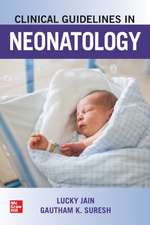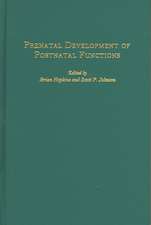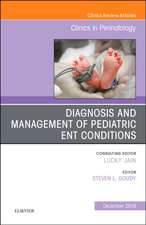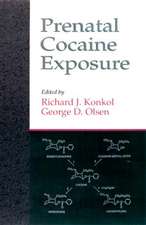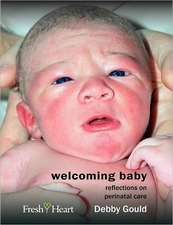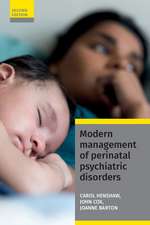Screening for Perinatal Depression
John Cox Editat de Carol Henshaw, Sandra Elliotten Limba Engleză Paperback – 31 mar 2005
Preț: 213.42 lei
Preț vechi: 288.50 lei
-26% Nou
Puncte Express: 320
Preț estimativ în valută:
40.85€ • 44.39$ • 34.34£
40.85€ • 44.39$ • 34.34£
Carte disponibilă
Livrare economică 31 martie-14 aprilie
Preluare comenzi: 021 569.72.76
Specificații
ISBN-13: 9781843102199
ISBN-10: 1843102196
Pagini: 240
Dimensiuni: 154 x 232 x 14 mm
Greutate: 0.37 kg
Editura: Jessica Kingsley Publishers Ltd
Locul publicării:United Kingdom
ISBN-10: 1843102196
Pagini: 240
Dimensiuni: 154 x 232 x 14 mm
Greutate: 0.37 kg
Editura: Jessica Kingsley Publishers Ltd
Locul publicării:United Kingdom
Cuprins
Foreword John Cox Introduction. Carol Henshaw. 1. Screening, the role and recommendations of the UK National Screening Committee. Judy Shakespeare, GP, Oxford, UK. 2. Advantages and disadvantages of screening in clinical settings. Tessa Leverton, Imperial College School of Medicine. 3. One bite of the cherry: a resource dilemma. Sheelah Seeley and Ann Girling. 4. Two bites of the cherry: one solution? Philip Boyce and Caroline Bell University of Sydney, Australia. 5. The EPDS as a tool for identifying new onset depression within the first postpartum year. Kathleen Peindl, Epidemiologist, Louisville, USA. 6. Screening in the context of integrated perinatal care. Bryanne Barnett, Patricia Glossop, Stephen Matthey, University of New South Wales, Australia, and Helen Stewart Liverpool Health Service, Australia. 7. The status of postpartum depression screening in the United States. Lisa Segre and Mike O'Hara, University of Iowa, USA. 8. Screening in developing countries. Dominic Lee and Tony Chung, Chinese University of Hong Kong. 9. Screening where there is no screening scale. Abi Sobowale, Sheffeld South West PCT, UK and Cheryll Adams Community Health Visitors' and Practitioners' Association, UK. 10. Screening for women at risk of severe mental illness. Margaret Oates, University of Nottingham, UK. 11. Screening and the role of the midwife. Mary Ross-Davie, Borders NHS Trust, Scotland, Lucinda Green and Sandra Elliott, St Thomas' Hospital, London, UK. 12. The Postpartum Depression Screening Scale. Cheryl Beck, University of Connecticut, USA. 13. What is the EPDS measuring and how should we use it in research? Josephine Green, University of York, UK. 14. Screening for perinatal depression: a denial of human reality. Walter Barker, Early Childhood Development Centre, Bristol, UK. 15. Acceptability of using the EPDS as a screening tool for postnatal depression. Jan Cubison, Sheffield Care Trust, UK and Jane Munro, Sheffield Teaching Hospitals NHS Trust, UK. 16. What do black Caribbean women think about screening with the EPDS? Dawn Edge, University of Salford, UK. Conclusions. Sandra Elliott. Appendix 1. The Edinburgh Postnatal Depression Scale. Appendix 2. Bibliography of available translations and validation studies of Edinburgh Postnatal Depression Scale, Postpartum Depression Screening Scale and other instruments used during pregnancy and postpartum. Appendix 3. The Edinburgh Postnatal Depression Scale: guidelines for its use as part of a maternal mood assessment. Briege Coyle and Cheryll Adams, References. Index.
Notă biografică
Carol Henshaw is Senior Lecturer in Psychiatry at the University of Keele, UK, and is a consultant psychiatrist at the Cheshire and Wirral Partnership NHS Trust. She is president of the Marcé society, a scientific society devoted to mental illness related to childbearing and has published numerous articles on perinatal depression. Sandra Elliott is Consultant Clinical Psychologist and team leader of the Maternity and Perinatal Partnership in Mental Health at St Thomas' Hospital, London, and is Honorary Senior Lecturer at the Institute of Psychiatry.

